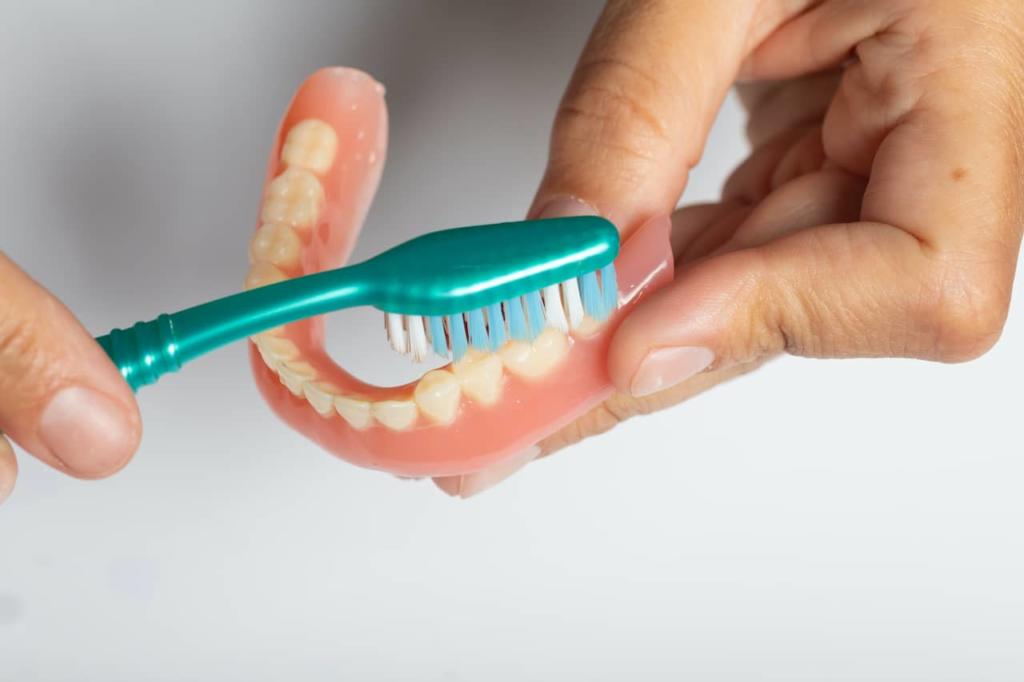
How Long Do Dentures Last?
By David Hudnall, DMD
Dentures are designed and crafted to be durable –– after all, they’re made to withstand harsh chewing forces and heavy use. However, that doesn’t mean that they last forever. So, how long do dentures last?
In this article, we’ll discuss how long dentures last and when you should consider getting new dentures.
Why Dentures Don’t Last Forever
“How long do dentures last?” is actually a two-pronged question. First, dentures are fabricated from man-made materials that scratch, stain, and wear out over time. I have had patients ask me to sharpen their denture teeth because they can no longer chew as well as they once did. No one can do this.
As denture teeth become worn and dull from use, they become flattened. The supporting acrylic develops microscopic cracks which allow the material to become brittle and harbor bacteria.
The second reason dentures don’t last forever is that the structure that supports the dentures ––– namely, your bone and gum tissue –– changes subtly with time. When you have natural teeth, your teeth move with your gums and the change is imperceptible. When you have dentures, you’ll notice after a while that the fit is not as snug as it once was.
Although a denturist can make adjustments to improve the fit, eventually you’ll need new dentures to correct for the changes. The synergy of both issues causes dentures to no longer be serviceable and require replacement.
How Long Do Dentures Last?
According to the American Dental Association, dentures have an average lifespan of 5 to 10 years. How long dentures last can also depend on many factors including your chewing habits and how you care for them. Some patients are hard on dentures because they are prone to parafunctional activity, such as grinding their teeth, which causes dentures to wear out prematurely.
Often patients go to one extreme or another when it comes to denture hygiene. Patients who don’t clean their dentures correctly will experience a buildup of tartar and stain that can shorten the longevity of their dentures. Some patients take cleaning far too literally and clean their dentures with actual toothpaste, bleach, or other harsh chemicals as if they were cleaning a bathroom floor.
The correct way to clean dentures lies somewhere in between. Appropriate care means using a denture brush and other products made especially for denture cleaning to remove all of the debris and stain on a daily basis.
Types of Dentures and Their Lifespans
Next, I am going to review the different types of dentures and discuss how their lifespans may vary.
Implant Dentures
How long do Snap-On dentures last?
In cases where dentures are completely supported by dental implants and the denture doesn’t rely on the gum tissue for support, Snap-On dentures can last anywhere between 10 and 15 years. This is because small changes in the gums and underlying bone don’t affect patient comfort. That said, implant-supported dentures do require yearly checkups and regular maintenance to ensure that the connection between the implants and the denture is functioning properly.
Full and Partial Dentures
How long do partial dentures last?
Acrylic and cast metal partial dentures generally last, on average, between 5 and 10 years if cared for correctly.
How long do full dentures last?
Complete dentures last an average of 5 to 10 years before they need to be replaced.
Flexible Partial Dentures
How long do partial dentures last that are made from flexible materials?
Because they are made from hybrid nylon material, flexible partial dentures are significantly less rigid than traditional partials. They are not considered a long-term solution but rather a stop-gap to restore functionality and prevent the remaining teeth from shifting while waiting for a more permanent tooth replacement. Most flexible partials last about 5 years.
Temporary and Immediate Dentures
How long do temporary dentures last?
Immediate dentures, also known as temporary dentures, are designed to be used for a maximum of one year after having teeth removed. During healing from extractions, your gums and jawbone will change dramatically. Once the dentures feel uncomfortable and the dentures feel loose you know it’s time to replace them.
If you are wearing temporary dentures for longer than one year, it’s time for new dentures. See your dental professional to be fitted for replacement dentures that will allow you to chew better with a greater degree of comfort.
Which Denture Is Right for You?
Deciding how to go about replacing missing teeth is challenging. Consider the following factors before picking a denture replacement.
Lifespan: While the longevity of dentures is important, it’s just one aspect to consider. Different types of dentures have varying lifespans, as mentioned earlier. Implant-supported dentures tend to last longer than traditional full or partial dentures. However, the lifespan of dentures should be considered in conjunction with other factors.
Fit and Comfort: The fit and comfort of dentures are crucial for your daily life. Ill-fitting dentures can lead to discomfort, irritation, and difficulty with chewing and speaking. Your dental professional will assess your jawbone structure, gum health, and bite alignment to ensure that your dentures fit well and provide optimal comfort.
Functionality: Dentures should not only look natural but also function effectively. This includes the ability to chew a variety of foods comfortably and speak clearly without slippage or discomfort. Implant-supported dentures offer superior stability and chewing efficiency compared to traditional dentures, making them a preferred choice for many individuals.
Cost of Treatment: The cost of dentures varies depending on factors such as the type of dentures, materials used, and any additional procedures such as implant placement. It’s essential to consider your budget and discuss payment options with your dental provider. While implant-supported dentures may have a higher initial cost, they often offer long-term benefits in terms of durability and functionality.
Oral Health Goals: Your personal oral health goals play a significant role in choosing the right dentures. Some individuals prioritize aesthetics and want dentures that look natural and enhance their smile. Others may focus more on functionality and seek dentures that improve chewing ability and overall oral health. Your dental professional will work with you to understand your goals and recommend the most suitable denture option.
Consultation with a Dental Professional
Now, if you’re trying to choose between the many denture options available solely based upon how long dentures last, you may be going about it all wrong. A dental professional can help you make the best decision for your unique situation.
During the consultation, your dentist or prosthodontist will assess factors such as:
- Your oral health history, including any existing dental conditions or concerns.
- The condition of your remaining teeth and gums, if applicable.
- Your jawbone structure and oral anatomy.
- Your preferences and priorities regarding denture aesthetics, functionality, and budget.
Based on this evaluation, your dental professional will recommend the most appropriate type of denture and discuss the benefits and considerations of each option. They will also address any questions or concerns you may have, ensuring that you make an informed decision about your oral health and denture treatment.
 Frequently Asked Questions
Frequently Asked Questions
How often should a denture be replaced?
Dentures typically need to be replaced every 5 to 10 years. However, this timeframe can vary depending on several factors. For instance, if you have implant-supported dentures, they may last longer because they are more stable and less prone to wear from chewing forces.
On the other hand, traditional full or partial dentures may need replacement sooner, especially if they are not well-maintained or if there are significant changes in your jawbone structure over time. Regular visits to your dentist or denturist can help assess the condition of your dentures and determine when replacement is necessary for optimal function and comfort.
How do you know when dentures need to be replaced?
There are several signs that indicate it’s time to replace your dentures:
Difficulty chewing: If you find it increasingly challenging to chew food properly or if your dentures slip or move around while eating, it may be time for new dentures.
Poor fit: Dentures that no longer fit well, causing discomfort, irritation, or sores in your mouth, need to be replaced to ensure a proper fit.
Visible wear and tear: Look for signs of wear on your dentures, such as worn-down teeth, cracks, or chips. Stains that are difficult to remove despite regular cleaning can also indicate the need for replacement.
Changes in appearance: If your dentures no longer provide a natural appearance or if they affect your speech, it’s time to consider new dentures. Regular dental check-ups and evaluations by a professional can help identify these issues and determine when replacement is necessary.
Can dentures last 30 years?
While it’s possible for dentures to last up to 30 years with exceptional care and maintenance, this is uncommon. The average lifespan of dentures is 5 to 10 years due to factors such as normal wear and tear, changes in bone structure that affect fit, and the materials used in denture fabrication.
Implant-supported dentures may have a longer lifespan because they are more stable and less prone to some of these issues. However, it’s essential to consult with your dental professional regularly to monitor the condition of your dentures and determine when replacement is needed for optimal oral health.
Can you live a long life with dentures?
You can! Remember that dentures not only improve your appearance and self-esteem, they also help you to eat properly. To reap the full benefits of wearing dentures, dentures must be well-constructed and fit correctly. Foods like fruits, raw vegetables, seeds, and nuts are crucial for the prevention of muscle and bone weakness and frailty.
You must be able to break down these raw, fibrous foods into small particles and chew the food sufficiently before swallowing for proper digestion and nutrient absorption. Dentures that don’t allow you to do this need to be replaced, regardless of their age.
Additionally, you also shouldn’t rely too heavily on denture adhesive to keep dentures in place. This will result in oral health problems.
European Denture Center Has the Solution!
European Denture Center is ready to help you choose the best denture solution for you and has several payment options available to make your choice more affordable. Our caring denturists and staff understand your needs, wants, and desires and work with you to assure your complete satisfaction.
See all of European Denture Center’s denture offerings and call or click to schedule today. You deserve the best dental lab and service!


